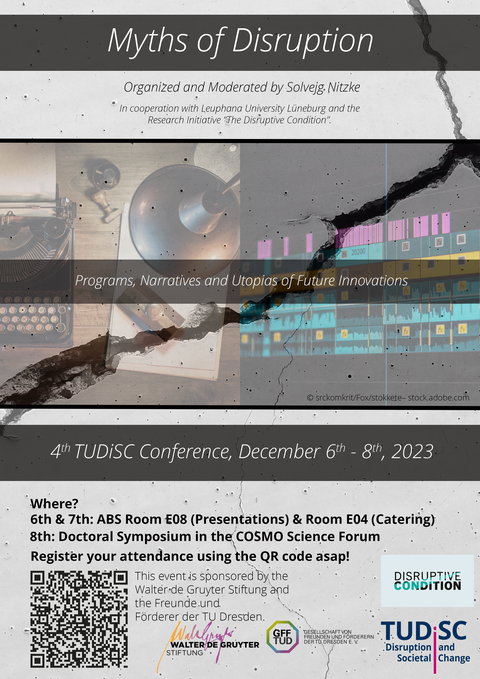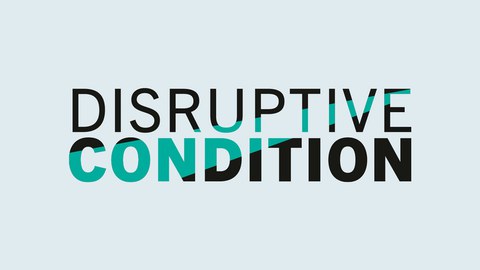TUDiSC Conference: Myths of Disruption. Programs, Narratives and Utopias of Future Innovations
Inhaltsverzeichnis
We have an exciting and diverse program of presentations and workshops exploring the multifaceted nature of the conference theme "Myths of Disruption".
The Doctoral Symposium will take place on December 8. More information can be found here.
Venue: August-Bebel-Straße 20, 01219 Dresden, Germany
December 6, 2023
|
14:30-15:00 |
Registration |
|
15:00-15:45 |
Welcome |
|
15:45-16:45 |
Panel I: Katharina Kaesling: Myths of Creativity and Intellectual Property Law: Beyond Digital Transformations Project DiaDisk: Disruptive Openness: Promises and Utopias of “Open Science" |
|
16:45-17:00 |
Break |
|
17:00-18:00 |
Panel II Katharina Motyl: When Failure Is Recoded as Disruption: How Neoliberal Myths Impede Reforms of the Academy Gabriela Christmann, Suntje Schmidt, Oliver Ibert: The Dual Nature of Disruption and the Necessity for a Socio-Spatial Perspective” |
|
18:00-19:00 |
Break |
|
19:00-20:30 |
Keynote : Kylie Crane |
December 7, 2023
|
|
|
|
8:30-9:00 9:00-9:05 |
Registration Welcome |
|
9:05-10:05 |
Panel III Noelia V. Rodríguez, Verónica Peña, Yvonne Ramírez Corredor and Matilde Carbajo: Disrupting Colonial Utopias. A Critical Examination of Historical Narratives of the Early Modern Colonization of the Mariana Islands. Ravi Chakraborty: Decoloniality: A Disruption in Search of an Axiom |
|
10:05-10:20 |
Break |
|
10:20-11:20 |
Panel IV Franz Erhard, Nadine Jukschat: The Idea of Social Innovations. Implicit Assumptions and Analytical Potential Patricia Ward: Caught up in the Logistics: An Exploration of Binaries and Categories as Methodological Containers |
|
11:20-11:40 |
Break |
|
11:40-12:40 |
Panel V Juliane Gamböck-Strätz: The Flows of Everyday Life and Forcefully Subtle Instances of Disruption Bernardo Paci: Knowledge Economy as a Myth of Disruption: idyllic Taylorism and Drucker’s Utopian Programme |
|
12:40-13:40 |
Lunch Break |
|
13:40-14:40 |
Panel VI Jordi Fairhurst Chilton: Deep Disagreements and Moral Progress Sergiu Spatan, Gundula Thiele: The Myth of the Obvious |
|
14:40-15:15 |
Break |
|
15:15-16:15 |
Panel VII David Manolo Sailer: The Politics of Disruptive Innovation Paula Muhr: Automating Image-Based Diagnosis of Functional Neurological Disorder: Challenges and Implications |
|
16:15-18:30 |
Break (Self-Catering) |
|
18:30-20:00 |
Keynote: Adrian Daub |
Abstract Keynote: Squelch, Mud, and Other Matters of Displacement (Kylie Crane)
This lecture starts with squelch. It’s the sound that you make when you mess with mud. It’s also a sonic practice of manipulating sound so that disturbances—disruptions—don’t interfere with the intended message. Crucially, though, enough disruption must remain in radio signals such that they can still be recognised as such. Squelch is both the practice of smoothing out disruptions as well as maintaining a certain background level of sound. Thinking with squelch as a heuristic for engagements with environments, I turn to muddy, swampy, wetland spaces in cultural and literary texts and contexts. The lecture will think about (representative) practices of dis-place-ment and uninhabitation as foundational for extractive regimes, as well as the squelch-y persistance of mud that persists in disrupting otherwise seemingly smooth spaces.
Abstract Keynote Selective Disruption (Adrian Daub)
Everything that is solid melts into air, everything holy is desecrated,” wrote Marx and Engels in the Communist Manifesto. The affirmative view of this process has, after some shapeshifting across the political spectrum, reached our present as the concept of “disruption”. If you listen to the prophets of Silicon Valley, everything that exists is worth that it should perish. The tech industry, and the ideology it uses to make itself plausible, regards the transformations wrought by its activities not merely as commerce, but as a mission – melting into air all that deserves melting. The world wants to be thrown into disarray, and technologists, enabled by massive capital infusions, are the only ones who can legitimately do so. This lecture is not about this language game, but about its lesser-noticed obverse. For our disruptors are, in some respects at least, traditional people. The disruption discourse is currently omnipresent and most of us can identify it as ideological. What is less noticeable are the discourses of exception: those language games that the same prophets of disruption engage in when they want to make it plausible why disruption is not legitimate under certain circumstances, when it emanates for certain actors, or is deployed to certain political ends. This lecture is not about disruption – it’s about where the disruptors want disruption to stop.
In cooperation with the Leuphana University Lüneburg and the Research Initiative “The Disruptive Condition”.
We thank our sponsors for helping to make this conference a success!
Gefördert durch die Gesellschaft von Förderern und Freunden der TU Dresden e.V.




